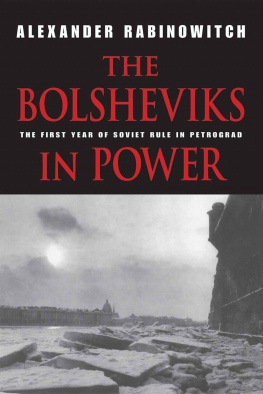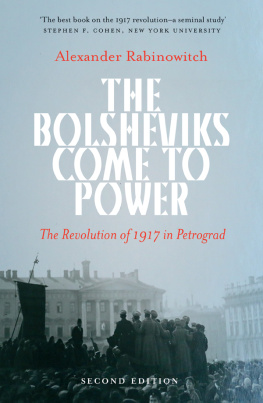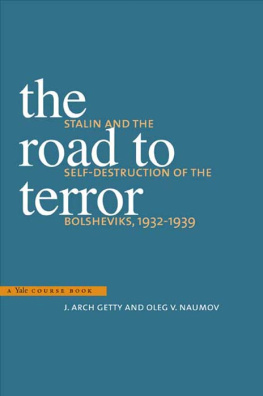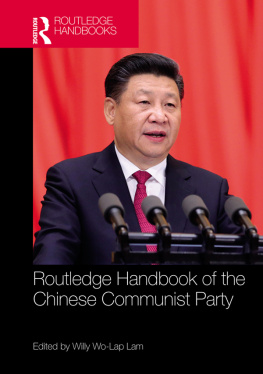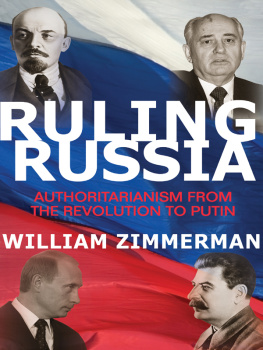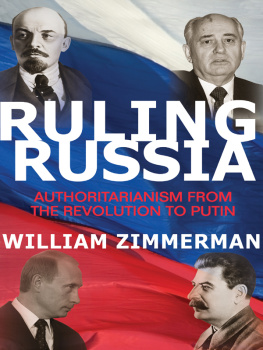PRACTICING STALINISM
PRACTICING STALINISM
BOLSHEVIKS, BOYARS, AND THE PERSISTENCE OF TRADITION
J. ARCH GETTY

Published with assistance from the Louis Stern Memorial Fund.
Copyright 2013 by Yale University.
All rights reserved.
This book may not be reproduced, in whole or in part, including illustrations, in any form (beyond that copying permitted by Sections 107 and 108 of the U.S. Copyright Law and except by reviewers for the public press), without written permission from the publishers.
Yale University Press books may be purchased in quantity for educational, business, or promotional use. For information, please e-mail sales.press@yale.edu (U.S. office) or sales @yaleup.co.uk (U.K. office).
Set in Sabon type by Westchester Book Group, Danbury, Connecticut.
Printed in the United States of America.
Library of Congress Cataloging-in-Publication Data
Getty, J. Arch (John Arch), 1950, author.
Practicing Stalinism : Bolsheviks, boyars, and the persistence of tradition / J. Arch Getty.
pages ; cm
Includes bibliographical references and index.
ISBN 978-0-300-16929-4 (cloth : alkaline paper) 1. Politics, PracticalSoviet Union. 2. Politics, PracticalSocial aspectsSoviet Union. 3. Soviet UnionPolitics and government19171936. 4. Soviet UnionPolitics and government19361953. 5. Kommunisticheskaia partiia Sovetskogo SoiuzaParty work. I. Title.
JN6581.G48 2013
324.247'07509041dc23
2013000343
A catalogue record for this book is available from the British Library.
This paper meets the requirements of ANSI/NISO Z39.48-1992 (Permanence of Paper).
10 9 8 7 6 5 4 3 2 1
Contents
Preface
For more than twenty years I sat first in Soviet libraries and then in Soviet and Russian archives studying the political history of Stalins time. As was common at that time, I was trained in Soviet studies by a few historians and several political scientists. My peers and I cut our teeth on Merle Fainsods How Russia Is Ruled, and we knew everything there was to know about the hierarchical pyramids and structures of the pattern of political controls. Although my intellectual path eventually led me to reject much of the totalitarian approach of such works, I remained convinced that there was a modern rational structure to Stalinist and Soviet power and that understanding the organization and interaction of institutions could reveal that structure, much as it could for Western countries and my native USA.
I visited Russia every year from 1987 and, like a good political historian, I assiduously pored through Soviet books, journals, newspapers, and eventually archives looking for the keys to this strange but recognizably modern society. The research difficulties we faced in those early years at the hands of hostile archivists, discouraging rules, pointless surveillance, and restrictions on access to materials brought the well-known forbidding power of ubiquitous Soviet bureaucracy home to us every day. For those of us studying politics, that seemed to provide a daily confirmation of the importance of understanding the history of that bureaucracy.
But for many of us, there were other Soviet and Russian experiences that were just as important. After work, we relaxed with Russian friends, spending long evenings eating and drinking and talking in the cramped kitchens of Moscow apartments. On weekends we would walk around the city and continue our mutually curious conversations about our respective societies. Perhaps because work was so stressful, I made an unconscious but sharp separation between work and leisure. At work I spent time with long-dead bureaucrats; after hours I mixed with very much alive average people. For a long time, these two circles of friends seemed to have little in common, even though some of my after-hours friends were themselves Communist Party members.
From those friends, I learned about Russia. I understood for the first time what it meant to be part of a group, a clan, an us. I understood the importance and comfort of doing informal favors for friends in the group, watching their backs as they watched mine, and learned the hundreds of informal (and sometimes technically illegal) ways to get things done, ranging from hitching a ride, getting a good cut of meat, buying a TV, or getting ones child into a good school. In the Soviet and later Russian climates of shortage, such skills and connections were important both economically and morally, and more than once I found nourishment of every kind at dinner with friends when my dorms caf and most of the grocery stores in town inexplicably closed.
In Russia, one often makes friends sequentially in networks. My first colleague in Leningrad introduced me to his two best army buddies, who introduced me to their neighbors, who introduced me to their dacha friends, and so forth. My circle consisted not only or even mostly of academics. As people my age often were, they tended to be sarcastic and irreverent about many things, and as I spent more and more time with them, I noticed that they put their irreverence into practice. They spent a good deal of time and energy sneering at rules, not only ridiculing them, but actively avoiding and violating them. The obtuse and uncooperative official system was impossible to navigate legally, so everyone learned how to circumvent it. One bought a drivers license. One bribed a policeman to leave one alone. One drove into the suburbs at night and gave a password in a clearing to get gasoline for the car. In a covert economy one used whatever resources one had based on reciprocity, friendship, and everything except the law. Avoidance of the official was the culture, and you helped your friends (and they you) to maneuver in a kind of parallel society that intersected the public, prescribed, official one only occasionally and accidentally.
Such behaviors are not new and scholars and journalists have written about them many times. They belong to the world of informal practices that, depending on whom you talk to, either subvert the system or help it to function efficiently. In either case, the general assumptionwhich I sharedwas that the line between informal social and formal political practices was firm and belonged to the era of Soviet bureaucracy and economic shortages.
But the more time I spent with my friends, the less clear that line seemed. Gradually, I began to detect a surprising convergence between the lives of my dead archival Bolsheviks and my dear living friends. For me, certain memories stand out as catalysts that launched my thinking in a different direction.
For a time in the early 1990s, I worked informally in a Russian university helping to establish a computer laboratory for quantitative methods in historical research. I worked with friends who worked under professors who worked under deans who worked under a vice rector in the usual Soviet pyramid arrangement. At one point, as a result of an intrigue in high places, one of the vice rectors was forced out. Even though this struggle of titans was many levels above my humble work, it immediately touched me and my friends. I was told that I needed to resign immediately at my own request. Why? Because I was connected to someone who was connected to someone who was connected to a client of the purged official. This is the custom here, I was told. Everybody goes; its pointless to argue. I was a victim of the age-old Russian notion of collective responsibility (krugovaia poruka, explored in ) and was reminded of the chains of clients who fell in tsarist or Muscovite times when a senior boyar or family lost position. Or when entire networks of people down to the lowest level were arrested when their senior Old Bolshevik patron fell to Stalins purges. No rule, law, or regulation dictated such a root-and-branch purge; it was an informal, customary practice in both my bureaucratic and my nonbureaucratic worlds that seemed to transcend centuries. Could both those worlds operate according to the same rules?
Next page


